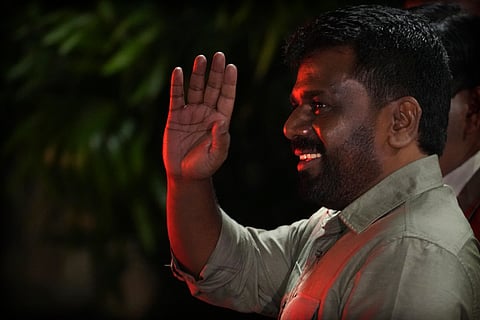Anura Dissanayake: JVP gets its biggest high with his rise
COLOMBO: Marxist leader Anura Kumara Dissanayake rose from a humble background to the pinnacle of leadership in Sri Lanka, presenting himself as a transformative leader to young voters and those tired of the "corrupt politics" of the traditional politicians.
Popularly known as AKD, 56-year-old Dissanayake was sworn in as Sri Lanka's ninth president on Monday by Chief Justice Jayantha Jayasuriya at the Presidential Secretariat.
His accession to the post is a remarkable turnaround for his half-century-old party Janatha Vimukthi Peramuna (JVP), which had long remained on the margins. He is Sri Lanka's first-ever Marxist party leader to become head of state.
The leader of the JVP's broader front, the National People's Power (NPP), Dissanayake's anti-corruption message and his promise of a change in political culture resonated strongly with young voters who have been demanding system change since the economic crisis.
The NPP's popularity has risen sharply since 2022 after securing only around three per cent of the vote in the last presidential election in 2019.
In his inaugural address to the nation after after taking the oath as President, Dissanayake said he will do his best to preserve democracy and work towards restoring the honour of politicians as people have misgivings about their conduct.
Earlier in an interview with Daily Mail online in August, he had said, "In our country, only an un-corrupt force will take action against the corrupt. The slogan of punishing the corrupt has been echoed on stage since 1994 under Chandrika ( Kumaratunga), Mahinda (Rajapaksa), Maithripala (Sirisena) and Gotabaya (Rajapaksa). The corrupt will never punish the corrupt. The corrupt always protect the corrupt. It is the NPP's priority to end corruption."
Dissanayake, during another event in March, passionately asserted that the political struggle is not merely about a change of government but an endeavour to usher in political, economic, and social transformations of paramount importance in Sri Lanka's history.
The NPP leader who hails from rural Thambuttegama in the North Central province is a science graduate from the Colombo suburban Kelaniya University.
He joined the JVP, the mother party of the NPP, in 1987 at the height of their anti-Indian rebellion. The JVP eliminated many activists of all democratic parties that supported the Indo-Lanka Accord of 1987.
The Rajiv Gandhi-J R Jayawardena pact was the direct Indian intervention to solve the Tamil demand for political autonomy in the country.
The JVP dubbed the Indian intervention as a betrayal of Sri Lanka's sovereignty.
However, Dissanayake's visit to India in February this year is seen as a change in the NPP leadership's approach towards India, expressing alignment with foreign investment interests.
With JVP's taking up democratic politics in the late 90s, Dissanayake got a place in the JVP central committee.
In the 2000 parliamentary election, he entered Parliament from the JVP. He has been an opposition livewire since 2001.
Dissanayake re-entered Parliament from the northwestern district of Kurunegala after the 2004 election in an alliance with the Sri Lanka Freedom Party. He was appointed the minister of agriculture.
With the JVP leaving the government over a joint mechanism with the LLTE on sharing the 2004 Tsunami relief aid to the North, then controlled by the rebel group, Dissanayake became the parliamentary group leader of the JVP in 2008.
He was again elected to Parliament in the 2010 parliamentary election from the Colombo district and became his party's chief in 2014.
Having won again from Colombo in 2015, he became the chief opposition whip, a post he held till 2019.
In 2019, the JVP rebranded itself as the NPP, which embraced sections of Sri Lankan society that had never been enamoured towards the JVP given its violent past. The party had led two bloody rebellions in 1971 and between 1987 and 1990 to overthrow popular governments and faced brutal state crackdowns each time.
Dissanayake faces the immediate challenge of determining the future of economic reforms in the cash-strapped country.
Historically, the NPP has opposed International Monetary Fund programmes, but its recent endorsement of the current programme, although with a renegotiation of its terms, marks a significant shift.

